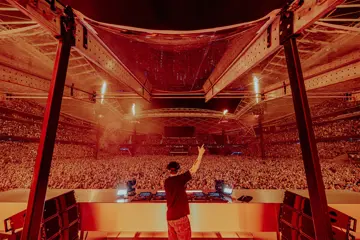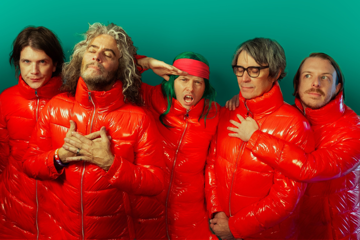Orange Country heavy-hitters Throwdown have been a permanent staple in contemporary hardcore for well over a decade. Having taken a break following 2009’s ‘Deathless’, the band returns with crushing new full-length, ‘Intolerance’. Killyourstereo.com recently sat down with main man Dave Peters prior to release to get an update on the album and plans for the year ahead.
G’day Dave, how are you?
Hey Kane, how you doing?
I’m going really well, thanks.
Two days from release in Australia, it’s [Intolerance] getting close now. What’s the prevailing feeling when it gets this close? Is it overwhelming excitement or maybe [you’re] a bit anxious just wanting to get it out?
It’s funny because by this point, the record has been recorded for so long. I always have this feeling about how people will feel about the record – based on how burnt out I am on the record at this point (laughs) because I’ve been listening to it so much.
I’ve had it [the album], my friends have had the record for so long. I’m really stoked for a lot of people that have been waiting a while to hear it to actually get the chance to do so. If nothing else, I’m just happy everyone can get a hold of it and I don’t have to worry about, “Is it going to leak?” (laughs). It’s exciting, especially because it has been a long time coming and I’m stoked.
Don't miss a beat with our FREE daily newsletter
Like you were saying there about it being a long time coming, it’s been about four and a bit years, in terms of crossing the t’s and dotting the I’s, what was the main motivating factor that initially got the ball rolling for writing and recording ‘Intolerance’?
Just the desire to [record]. Over the years, I’ve equated making records to getting tattoos. You love having it completed – it’s this great thing, it’s this piece of art but it can be a little gruelling if not annoying and painful at times, the actual process of it. The way the recording is, it’s not like you get in there and bang out a song the way you would in a live set. You could, but it wouldn’t have the sound people want. It wouldn’t have that tightness. As far as the actual motivation part goes, I just felt I had the time. I had some riffs that had been swirling around in my head for a while and it just felt like it was the right time to get them put together into songs and recording it.
Jarrod [Alexander, drums] who I’ve recorded a lot of records with was in the right spot, timing-wise, to be able to do it. Dave Nassie who has played with Bleeding Through before, he jumped in and filled in for some shows back in 2011 and he did it on such short notice, and did such an incredible job. When we got done with him he was like, “I know you’re not grinding out on the road more days a year than not anymore, but whenever you need someone I’m happy to be a member of this band.” So that evolved, Dave was eager to do something too. He had a contribution as well to the record. He did a lot of solos and lead work. Everything just came together and I got to record it right down the street from my house at Hurley [Studios]. It was killer.
Talking about recording, each album they’re apples and oranges – each different to the next and hard to compare. You’ve been doing this for well over a decade now, when it comes time to record an album, does the general mentality to music change over time?
I think there’s a natural element when you’re a certain age. Your life experiences and all the things that affect you eventually they come out in the music you’re writing or anything like that. Whether or not you’re writing lyrics or riffs, they’re all going to have something about them that reflects your life and its current state. It’s not that premeditated. I don’t in advance say, “I want to write this kind of record.” To me that doesn’t feel authentic, I just want to do what feels natural at the time. The one thing I do have in mind going into making records is I want there to be a continuity between records, I don’t want it to sound like a completely different band each time, but at the same time, I want them to be different from one another.
I guess there’s an expectation with every bands fan base with what they want out of a particular band. The last record [Deathless] maybe I was a little selfish and did some things moreover that were just what I wanted to do and were a little outside the expectations for kids that had been long-time fans of the band. This time around, there was a premeditated component of the approach to the record. A premeditated approach as far as keeping things a little more simple. The songs are a lot shorter and a lot more stripped down. There was an effort to say as much as I could in as little time as possible, which is a rewarding challenge in itself. I think we accomplished [that] quite honestly.
You were saying a few moments ago that you recorded [the album] just down the road from your house. One thing that has been cool about Throwdown and [similar] bands is the Orange County community. Bleeding Through, Adamantium, Eighteen Visions, and all those band members helping each other out. I remember watching Bleeding Through’s documentary DVD ‘Wolves Among Sheep’ and seeing how cool the Orange County scene was. How important has that been for a band like Throwdown in terms of the support you get from fellow bands?
In full honesty, it all started [and] things were very cohesive, and there was so much like musician incest. Bands had members that were in two bands or three bands; there was a lot of camaraderie and friendly competition. I think over the years, things became a little more fragmented than they were when we first started, which is natural. It’s no different than if you’ve got x amount of friends in high school or whatever and [then] you find yourself into adult life. There’s definitely camaraderie amongst those friends and some of the other band members from other groups. Like anything else, it’s changed – it’s a little different than it used to be. With that being said, there were guys that were roadies for Throwdown 10 years ago that are still friends of mine and I’ll keep in touch with them here and there. I’ll get a text message from them about how stoked they are for the record or they heard a new song and it was great, or I’ll send them the new record and they’ll be really supportive. To an extent, it never really goes away.
Another thing I noticed looking at your Facebook page recently was you posted photos of fans uploading pictures of Throwdown tattoos. How does that make you feel that your music has that much of an impact that they would ink their body with logos and lyrics etc.?
It’s pretty insane (laughs). That never gets old. We’ve had, for years, guys we’ve met on tour go, “hey, look I got this Throwdown tattoo!” They’ll pull their shirt up and it just says Throwdown across their chest (laughs). There’s nothing that will make that any less cool no matter how many times you see it. A band should be so lucky that their lyrics mean so much to somebody to make them a permanent part of them (laughs). I’ve got a couple friends of my own, close friends who are tattoo artists. There’s also that element as far as a tattoo goes that it’s an actual meaning. I feel like these days it’s so easy for people to try and insert or force these meanings into tattoo imagery they’ve got or something that looks cool on them. Tattooing in a lot of ways has changed as well. I think it’s really cool from a standpoint of a few words of a song meant enough to somebody that they went, “Ok, I’m going to get this tattoo.” And that it came first – the meaning came before the artwork. To sum up, it will never get old (laughs). I’ll always be super stoked every time somebody sends a tattoo our way.
Hardcore in general has always been predicated by the energy, the passion and emotion. With you guys, how important is the message in terms of the lyrics when writing an album in [how it is] received? Is that just as big an emphasis as the music itself?
It is [but] it’s hard to compare the two just because they’re very different from each another. The sound of the music and the message you try and make a cohesive thing of course. If you’re asking if it’s important I’m saying something real and hopefully resonates with someone then yeah, I’d say that’s the most important thing, period. The music does that in a nebulous way – it’s hard to put your finger on. A certain riff or certain song will make you feel a certain way. Obviously most hardcore and metal songs have that, like you said, that high energy of them – that driving force about them.
I think every song should carry a message even if it’s something that is super esoteric. I’ve got some that I’ve written that are really personal and there’s not another person in the world that really knows what it means. I just made sure I wrote it in such a fashion that it doesn’t matter and it can mean something to each person, and they can apply that in their own way to their own life and experiences. They may never know what the real inspiration or the people who inspired the song, they will never know about that because it’s something really personal to me. But, whether it’s a personal experience or if it’s a political gripe or a bone I have to pick with American culture or culture in general, I always want every song to actually state something. I think there’s unfortunately a little bit of lyrics coming second a lot of times in song writing in some of these bands calling themselves hardcore bands. It’s [the meaning] is always important to me.
Have you got 2014 well mapped out?
I’ll be honest with you, we’re kind of playing things as they come. If there seems like there’s a big demand to do certain tours around the world then we’ll go to those places, but it’s not my goal. I’ve done this a long time. In 2010 things came to a head in a lot ways for the band. It just felt like it was time to pump the brakes a little bit on touring. I think for me, for this record, because I love making music and because it means something to me and I know it means something to a lot of other people out there, if it means enough that they want to hear these songs live in Pennsyltucky, America (laughs) then cool, we’ll go play a show there. As far as touring the whole world in six months then come back in another eight months, that’s not going to happen. It will sort of be on the fly, we’ll just see how it goes. For the people that really want to see a show, they’ll hopefully get one…maybe they’ll have to travel a little further to get to do it but it will still be worth it when it actually happens.
In Australia we are absolutely thrilled to have Throwdown back and making music and it’s been a pleasure talking to you Dave.
Thanks man. I really hope we can make it down there. Bullshit aside, Australia is one of my favourite places to visit. We’ve been there a handful of times and went to New Zealand as well – it’s great. People have always been great to us whether it’s the people that are behind the curtain making everything happen, we had Graham [Nixon, Resist] out there forever helping us out there. Everybody part of the community there has been awesome to us. If nothing else, I hope we can make some time to come out there again, it’s always a good time – we’d look forward to it if we can.
Thanks so much for those words. Have a good rest of the day Dave.
Cool, thanks Kane. Appreciate it man.
‘Intolerance’ is out now via Shock / eOne.
















